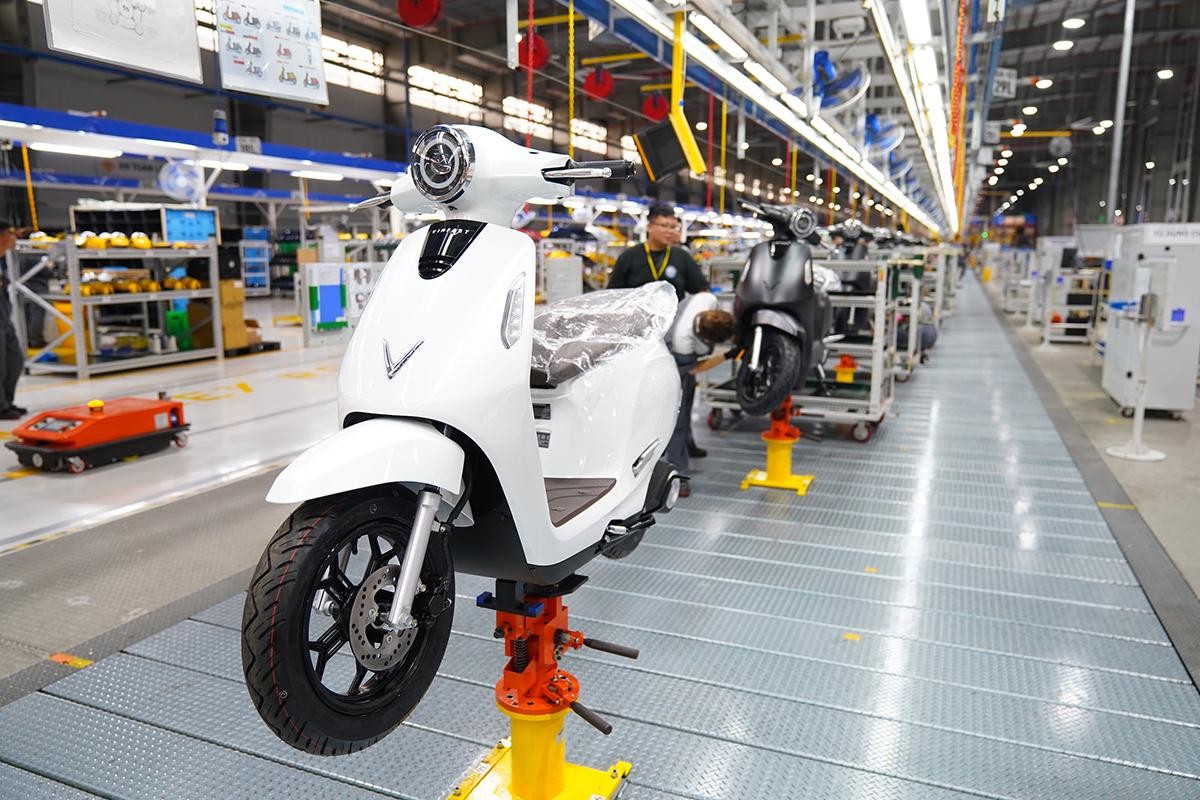With the trend of automobile electrification, the electric motorcycle industry has become boisterous over the years, noting that the consumers’ habit of shifting from petrol to electric vehicles will become a bumpy road for policymakers and EV manufacturers, according to experts.

Partnerships are an optimal solution to promote internal resources and improve the competitiveness of local businesses in the development of Viet Nam's electric vehicle (EV) market, according to auto experts.
With the trend of automobile electrification, the electric motorcycle industry has become boisterous over the years, noting that the consumers’ habit of shifting from petrol to electric vehicles will become a bumpy road for policymakers and EV manufacturers, according to experts.
A report from the Vietnam Association of Motorcycle Manufacturers (VAMM) shows that in the first quarter of the past five years, motorcycle sales were stable at over 700,000 units, with annual sales of about three million.
Consumers often choose familiar brands such as Honda, Piaggio, Suzuki, SYM and Yamaha.
The motorbike market in Viet Nam has reached a saturation point with increasingly higher incomes. People have been gradually shifting from motorcycles equipped with internal combustion engines to electric bikes with beautiful designs, reasonable prices and cost-saving compared to petrol prices.
Viet Nam’s motorcycle market stumbled in the first three months of 2023 as demand dropped.
Sales fell 23.7 per cent in the first quarter this year compared to the previous quarter and 15.8 per cent over the same period last year, according to data released by the VAMM.
A total of 634,688 units from five manufacturers, including Honda, Yamaha, Suzuki, Piaggio and SYM, were sold in the first three months. This proves that purchasing power has shown signs of a decrease, and stockpiled sales will be higher in the remaining months.
Meanwhile, the segment of electric motorcycles has seen handsome growth in recent years.
According to statistics from the Traffic Police, by the end of 2022, Viet Nam had nearly two million newly-registered electric motorbikes, accounting for 2.7 per cent of the total number of motorbikes nationwide. The sale of electric motorcycles in 2022 increased between 30-35 per cent compared to 2021.
According to Motorcycles Data's forecast, Viet Nam is the largest electric two-wheeler (E2W) market in the ASEAN region and the second largest E2W market worldwide, after China.
Currently, electric motorcycles produced and assembled in Viet Nam are more diversified, with the participation of domestic manufacturers such as VinFast, Son Ha, and Pega.
Motorcycle manufacturers such as Honda, Yamaha, SYM, and Piaggio have also started researching and producing new models in Viet Nam. This has contributed to eradicating the prejudices about cheap electric two-wheelers.
Currently, except for VinFast, no domestic manufacturers have seriously invested in battery technology, hardware and software for EVs. VinFast is the only one that installed charging stations in 63 cities and provinces. That is a competitive advantage that few businesses have in producing EVs.
For products with high technology content, such as electric cars and motorcycles, the most difficult thing for manufacturers is to master the core technology of motors and batteries. Vingroup established VinES Energy Solutions JSC with its main business of producing batteries and accumulators.
VinES, the energy solutions division of Vingroup, has worked with a series of global leading enterprises in batteries and energy solutions, such as ProLogium, Li-Cycle, BP, and Gotion, Inc. VinES also signed a memorandum of understanding with Cavico Lao Mining Co., Ltd (a member of Cavico Vietnam) on the supply of Nickel raw materials for the production of lithium batteries.
Son Ha Development Of Renewable Energy JSC (SHE), a member of Son Ha Group, is also one of the pioneers in the production of electric motorcycles. In the next 5-10 years, Son Ha hopes to become one of the three largest electric vehicle manufacturers, assemblers and suppliers in Viet Nam, accounting for 10-20 per cent of the domestic two-wheeler market share (about 300,000-600,000 vehicles a year).
Last month, SHE signed a strategic cooperation agreement with VinES. The cooperation aims to provide comprehensive energy solutions for batteries, charging stations and ecosystems for EVs.
Hoang Manh Tan, deputy general director of Son Ha group, said despite the difficulties and challenges facing the company, electric motorcycles were still a promising industry that needed to be further invested in the next years in line with the Government’s policy and global trends.
Nguyen Hoang Giang, Deputy Minister of Science and Technology, said the cooperation between the two companies would bring a comprehensive solution in terms of batteries, charging stations and ecosystems, contributing to the concrete implementation of the Government's policy in transportation.
Viet Nam’s green energy transformation action program aims to develop a green transportation system that will reduce net greenhouse gas emissions to “zero” by 2050. The objective is for all motor vehicles and motorcycles on the roadway to be powered by green electricity and energy by 2050. — VNS





